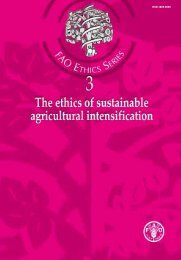Asian-Arab philosophical dialogues on globalization, democracy ...
Asian-Arab philosophical dialogues on globalization, democracy ...
Asian-Arab philosophical dialogues on globalization, democracy ...
Create successful ePaper yourself
Turn your PDF publications into a flip-book with our unique Google optimized e-Paper software.
Public Debate, Shûra, (overlapping) C<strong>on</strong>sensus,<br />
Ijma’: Toward a Global C<strong>on</strong>cept of Democracy<br />
Soumaya Mestiri, Tunisia<br />
38<br />
Asia-<str<strong>on</strong>g>Arab</str<strong>on</strong>g> Philosophical Dialogues <strong>on</strong> Globalizati<strong>on</strong>, Democracy and Human Rights<br />
The fact that Muslim fundamentalists and Western political thinkers join in the idea of an “Islamic<br />
excepti<strong>on</strong>” is very interesting to notice. The former promote a truly unique dogma, which embraces all<br />
aspects of the human life. They put forward that Islam is endowed with a c<strong>on</strong>cept of <strong>democracy</strong> and<br />
that it is therefore not in need of an exogenous experience to provide it with what it already possesses.<br />
Because they are often good at exegesis of texts, Muslims fundamentalists are able to base their<br />
dem<strong>on</strong>strati<strong>on</strong> <strong>on</strong> verses of the Quran where the noti<strong>on</strong>s of shûra and ijma’ are clearly present. They<br />
intend to show that the bedrocks of <strong>democracy</strong> are typically Muslim and that all discourses which try<br />
to improve the Islamic traditi<strong>on</strong> actually c<strong>on</strong>solidate West’s repeated attempts to reduce the value of<br />
Islam. But <strong>on</strong>e can say that ideas and noti<strong>on</strong>s we are full of can never be c<strong>on</strong>sidered as a threat, but <strong>on</strong><br />
the c<strong>on</strong>trary, as an extraordinary richness. This is borne out by the fact that thinkers and philosophers<br />
living <strong>on</strong> the land of Islam, from Kindi to Ibn Kkaldun, appropriated and assimilated a genuinely Western<br />
legacy – the same <strong>on</strong>e that is judged nowadays to be dangerous by some people.<br />
To the c<strong>on</strong>trary, the latter; i.e. Western thinkers, criticize the propensity of Islam to produce exclusively<br />
authoritarian regimes and, armed with the observati<strong>on</strong> of the political reality of the <str<strong>on</strong>g>Arab</str<strong>on</strong>g>-Islamic world,<br />
assert str<strong>on</strong>gly the essential anti-democratic feature of the Muslim traditi<strong>on</strong>. To this Eurocentrist point<br />
of view, <strong>democracy</strong> prides itself with a unique origin, that is Greece. The idea that <strong>democracy</strong> is born<br />
in Athens is <strong>on</strong>e am<strong>on</strong>g those ideas which acquired, with time, an incommensurable sacredness.<br />
Nevertheless the Roman origins of <strong>democracy</strong> are at least as important as the Greek <strong>on</strong>es, to the extent<br />
that Western modernity had drawn from them its rais<strong>on</strong> d’être, if not its instituti<strong>on</strong>s. It is thus easy for the<br />
Western traditi<strong>on</strong> to claim to go back to the spirit of Greek sources while it obviously owes its birth to a<br />
Roman experience which is, by nature, nearer to the provisos and bases <strong>on</strong> which it was gradually built.<br />
Indeed, the noti<strong>on</strong> of popular sovereignty is more Roman than Greek: <strong>on</strong>e will easily c<strong>on</strong>cede that it is<br />
not the Athenian restricti<strong>on</strong> of citizenship to native and free men that would refute this truth.<br />
This seminal idea is employed for two purposes, which are closely related to <strong>on</strong>e another. Indeed,<br />
showing the Western uniqueness of the democratic experience comes down to dem<strong>on</strong>strate the<br />
political authoritarianism in force in Muslim countries. This kind of theoretical provincialism takes a<br />
particular form nowadays, inherent in the tendency to assert, more or less, the hegem<strong>on</strong>y of the liberal<br />
model of <strong>democracy</strong> in terms of both value and validity. Indeed, those who insist <strong>on</strong> the uniqueness of<br />
the sources of <strong>democracy</strong> are the same who affirm the uniqueness of its forms, methods and practices.<br />
Reference is made here to Fukayama, who claims that the triumphal advent of liberal <strong>democracy</strong> has<br />
rung the end of history.<br />
Yet, the affirmati<strong>on</strong> of such liberal hegem<strong>on</strong>y, has lost ground since the publishing of Amartya Sen’s works<br />
<strong>on</strong> the subject. According to him, the democratic phenomen<strong>on</strong> doesn’t c<strong>on</strong>cern <strong>on</strong>ly <strong>on</strong>e civilisati<strong>on</strong> or<br />
traditi<strong>on</strong> more than another and is not, moreover, about a unique experience with forms and practices<br />
precisely drawn. In his appropriately titled book, The Democracy of Others, Sen dem<strong>on</strong>strates that India<br />
and the <str<strong>on</strong>g>Arab</str<strong>on</strong>g>-Muslim world have both experienced <strong>democracy</strong> in more than <strong>on</strong>e way, highlighting the<br />
fact that tolerance and respect were not empty words.<br />
My aim in this paper is to dismiss these two apprehensi<strong>on</strong>s of the Islamic excepti<strong>on</strong>, without being in<br />
favour of either. I will show that they are both based <strong>on</strong> a theoretical provincialism and an obvious denial<br />
of history. I will try to define to what extent it is possible to shed light <strong>on</strong> genuinely Islamic c<strong>on</strong>cepts<br />
which possess a highly democratic potential, that’s to say the c<strong>on</strong>cepts of shûra and ijma’, using some<br />
Western theoretical experiences whose nature and relevance in such a task will be examined.<br />
I would say here that I’m not trying to replace a particular Eurocentrism by another. All I want to do is to<br />
underline, as you’ll see it, an audacious and productive analogy made by the great learner Ibn Khaldun<br />
(1332-1406) between the Roman republic and the Muslim shûra. By doing so, I wish to highlight a<br />
meeting and certainly not a fate, that is to say the meeting of a particular Western legacy and the <str<strong>on</strong>g>Arab</str<strong>on</strong>g>-<br />
Muslim traditi<strong>on</strong>, a meeting which could have been full of great c<strong>on</strong>sequences for the whole world.

















